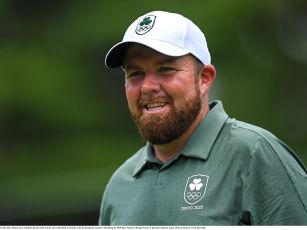The top 64 players in the world are taking part in the WGC Dell Technologies Match Play this week.
They are split into 16 groups with four players in each group. Each competitor plays everyone in their group and whoever emerges with the most points after the three matches qualifies to the round of 16.
From here each match is exactly like any knock out match. If you win you advance, if you lose you go home. Match play golf is very different to stroke play golf, which is what we are used to seeing week in, week out.
In stroke play golf, the objective is to shoot as low a score as you can over the four days of play. Your accumulated score is put against everyone else’s and whoever has the lowest score is the winner.
Match play is different. You are just playing against your opponent. It’s one on one. You win by beating your opponent on more holes than he has beaten you on.

The widely known term ‘gimme’ in golf originated from the match play format. In stroke play you must finish out every hole. You cannot pick your ball up before the hole has been finished, no matter how easy or hard the putt is. Match play is different.
It is up to the opponent on whether or not they want you to finish out the hole. You may have a little bit of work left on your putt and your opponent might be feeling generous and says “gimme” which gives you the signal that you can pick up your ball and move on to the next hole. Something like that is down to the discretion of your opponent.
A huge reason why certain players like the format of match play is because one or two really bad holes will not destroy your overall position although you will most likely lose those holes. For example if Rory McIlroy shot two triple bogeys on his opening two holes of a stroke play golf tournament - in theory he could still come back and do well but already he would be way behind.
In match play if that were to happen you would most likely only be two holes down, which can be clawed back on the next two holes. Match play suits players that are mentally tough. Even if a player isn’t playing his best he should find a way to dig deep and keep in touch with his opponent for as long as possible.
Groups to look out for:
Group One - This group features world number one Dustin Johnson. A win here will see him complete the Grand Slam in WGC events. The other three are not too bad either. All of which are major champions. Johnson comes in off two consecutive PGA tour wins but he will need to be at his best if he is to get past Jimmy Walker, Martin Kaymer and Webb Simpson.
Group Three - An intriguing group that has a lot of quality. Marc Leishman, who will be fresh off his win at Bay Hill last week is one of two Australians in the tournament. The other is defending champion Jason Day and they are both in the same group! Pat Perez will also feature and he will be feeling confident as he has already won on the tour this year. Finally Lee Westwood makes up the lot and he is player with buckets of experience. Westwood has more WGC starts than any player in the field.
Group Sixteen - A very difficult group to call. The group consists of Matt Kuchar, two time major winner Zach Johnson, Tommy Fleetwood and Brendan Steele. Kuchar and Johnson are match play experts. Kuchar has five top tens and a victory to his name which came in 2013 but Johnson loves this sort of format. Fleetwood is probably one of the most in form players on the PGA tour right now finishing second at the WGC Mexico Championship and tied tenth at Bay Hill last week.
Download the brand new OffTheBall App in the Play Store & App Store right now! We've got you covered!
Subscribe to OffTheBall's YouTube channel for more videos, like us on Facebook or follow us on Twitter for the latest sporting news and content.








